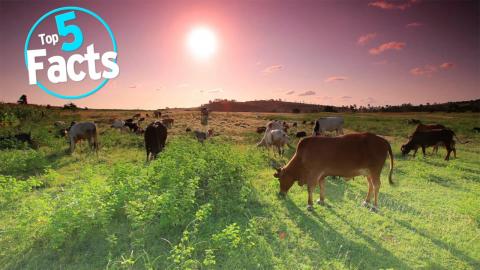Top 5 Facts About Veganism

Put down that juicy steak and listen up. Welcome to http://www.Watchmojo.com and Top 5 Facts. In today's installment, we're counting down the most interesting and original facts about Veganism that you might not have heard before. To be clear, we're mostly discussing veganism, which involves a diet free of animal-derived foods like meats and cheese, as opposed to vegetarianism which typically includes some eggs and dairy products.
Special thanks to our user tandee82 for submitting the idea using our interactive suggestion tool at http://www.WatchMojo.comsuggest
- Written by Nathan Sharp
- Humanity May Have Evolved Because of its Non-Vegan Diet
- Up to 6% of the United States is Vegan, and a Large Majority of Non-Meat Eaters Are Women
- A Vegan Diet Sees Better Results in Weight Loss Attempts
- A Vegan Diet May Lead to an Increased Risk of Heart Disease
- A Majority of People Who Attempt a Vegan Diet Abandon It
#5: Humanity May Have Evolved Because of its Non-Vegan Diet
While a vegan diet may be healthy, humanity owes a debt of gratitude to their carnivorous ancestors. At least two independent studies looking at fossil evidence suggest that eating cooked foods, including meat, helped our ancestors’ brains to grow over millions of years into the brains humans have today thanks to the calories present in meat. Without cooking food, researchers say, it would have been impossible to get enough calories to increase our species’ brain size, and without meat, we wouldn’t have gotten the necessary protein, fats and vitamin B12 for brain growth. So while it’s entirely possible for people to live on vegan and even raw vegan diets today, we may not have become the species we are today if that’s what all our ancestors had done.
#4: Up to 6% of the United States is Vegan, and a Large Majority of Non-Meat Eaters Are Women
It's no surprise that vegans are in the minority when it comes to their diet. There’s conflicting data about just how many vegans are out there though. According to research firm Faunalytics, 0.5% of American adults are practicing vegans, whereas the Nutrition Business Journal Food Tribes Report from early 2015 puts it as high as 6%. Perhaps most surprisingly, is that up to 74% of those who don't eat meat, whether it be vegetarians or vegans, are female. While sources may disagree on figures, they all seem to indicate that, in the west, abstaining from meat is a predominately female practice.
#3: A Vegan Diet Sees Better Results in Weight Loss Attempts
While losing weight can be a long and arduous process, research suggests that going full vegan is the most prosperous route to take. A scientific review of twelve different diet trials that was published in 2015 suggests that people who practice vegan diets see much better results in weight-loss programs. A 2014 study from the University of South Carolina also found that over the course of 6 months, vegans lose more weight than vegetarians, pecsitarians, and omnivores. Experts say this is because the intake of vegetables, grains, and fruits provide essential nutrients for weight loss, such as fiber, and help to keep blood sugar at a reasonably stable level.
#2: A Vegan Diet May Lead to an Increased Risk of Heart Disease
While veganism may be good for your weight, it's not as good for your heart. A vegan diet lacks several key nutrients, such as omega-3 fatty acids and vitamin B-12, which leads to an increased risk in developing blood clots or hardened arteries, leading to strokes and heart attacks. But wait– research done at St. Michael's Hospital in Toronto shows that a low-carb vegan diet, can decrease the risk of heart disease by as much as 10% over ten years. So, I guess a vegan diet can be both detrimental and helpful, depending on how and what you eat…? Or maybe the take-away is that when it comes to nutrition, science will contradict itself eventually, and what was going to make you live for ever, is now going to kill you and viceversa and I give up, give me a bacon milkshake.
#1: A Majority of People Who Attempt a Vegan Diet Abandon It
While many people may attempt a vegan diet out of respect for animals or for their own personal health reasons, many end up abandoning the practice. According to Faunalytics, 2% of the US population are vegetarians or vegans, while 10% of the population are former vegetarians or vegans. While we don’t know the proportion of vegans who quit per se, these numbers could suggest that 83% of people who try veganism abandon it. The most common reasons for getting back on the meat train aare problems like boredom with veggie food options and finding it difficult to sustain a meat-free diet. There is however, some data that suggests that those with multiple motivations to make the switch–like for instance health reasons, and a concern for the environment, and taste preference– are more likely to stick to it.
What do you think of veganism? Have any tips to make the switch stick? For more evolutionary top tens and fatty acid top fives, be sure to subscribe to Watchmojo.com.


 1
1
 0
0
 report
report

 0
0
 2
2
 flagged
flagged